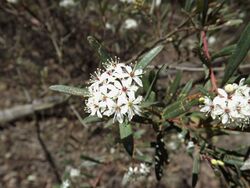Biology:Leionema obtusifolium
| Leionema obtusifolium | |
|---|---|

| |
| Scientific classification | |
| Kingdom: | Plantae |
| Clade: | Tracheophytes |
| Clade: | Angiosperms |
| Clade: | Eudicots |
| Clade: | Rosids |
| Order: | Sapindales |
| Family: | Rutaceae |
| Genus: | Leionema |
| Species: | L. obtusifolium
|
| Binomial name | |
| Leionema obtusifolium (Paul G.Wilson) Paul G.Wilson[1]
| |
Leionema obtusifolium, is a small shrub with yellow-white flowers in terminal clusters at the end of branches. It is endemic to Queensland.
Description
Leionema obtusifolium is a small shrub to 1 m (3 ft 3 in) high with a smooth, shiny appearance. The branchlets are flattened with noticeable acute angles and a finely warty surface. The sessile leaves are smooth, papery, narrowly elliptic or with straight sides and rounded apex to spoon-shaped, 25–50 mm (0.98–1.97 in) long, 3–6 mm (0.12–0.24 in) wide, minutely scalloped near the apex that is rounded to blunt. The flowers are a cyme formation of 10-20 flowers at the end of branches on slender stalks 4–8 mm (0.16–0.31 in) long. The sepals are hemispherical shaped, 0.5 mm (0.020 in) long and the lobes 0.25 mm (0.0098 in) long. The yellowish white spreading petals are narrowly egg-shaped, about 4 mm (0.16 in) long and the stamens more or less equal in length of the petals. Flowering occurs in spring.[2]
Taxonomy
This species was first formally described in 1970 by Paul G. Wilson and gave it the name Phebalium obtusifolium.[3][4] In 1998 Paul G. Wilson changed the name to Leionema obtusifolium and the name change was published in the journal Nuytsia.[5][6]
Distribution and habitat
This species has a restricted distribution, growing on sandstone hills in the Helidon and Ravensbourne areas of south-eastern Queensland.[2]
Conservation status
Leionema obtusifolium is classified as "vulnerable" by the Government of Queensland Environment Protection and Biodiversity Conservation Act 1999.[7]
References
- ↑ "Leionema obtusifolium". https://biodiversity.org.au/nsl/services/apc-format/display/154767. Retrieved 21 June 2020.
- ↑ 2.0 2.1 Wilson, Paul G. (1999). Flora of Australia-Volume 26 Meliaceae, Rutaceae, Zygophyllaceae. Canberra/Melbourne: ABRS-Department of Environment & Heritage. pp. 437–438. ISBN 9780643109551.
- ↑ "Phebalium obtusifolium". https://biodiversity.org.au/nsl/services/rest/instance/apni/499953. Retrieved 24 June 2020.
- ↑ Wilson, Paul G. (1970). "A Taxonomic Revision of the Genera Crowea, Eriostemon and Phebalium (Rutaceae)". Nuytsia 1 (1): 107. https://www.biodiversitylibrary.org/item/223300#page/113/mode/1up. Retrieved 24 June 2020.
- ↑ Wilson, Paul G.. "Leionema obtusifolium". https://biodiversity.org.au/nsl/services/rest/instance/apni/556941. Retrieved 24 June 2020.
- ↑ Wilson, Paul G. (1998). "New species and nomenclatural changes in Phebalium and related genera (Rutaceae)". Nuytsia 12 (2): 276. https://www.biodiversitylibrary.org/item/226456#page/122/mode/1up. Retrieved 24 June 2020.
- ↑ "Leionema obtusifolium". Australian Government, Department of Agriculture, Water & Environment. http://www.environment.gov.au/cgi-bin/sprat/public/publicspecies.pl?taxon_id=64925. Retrieved 24 June 2020.
Wikidata ☰ Q15392248 entry
 |

